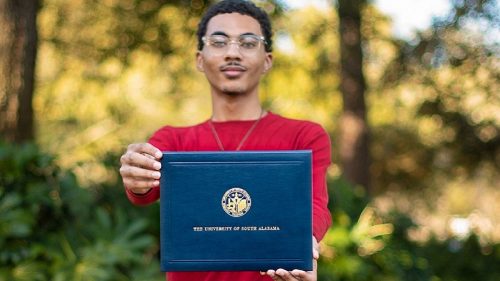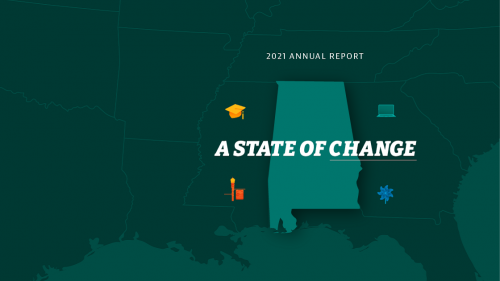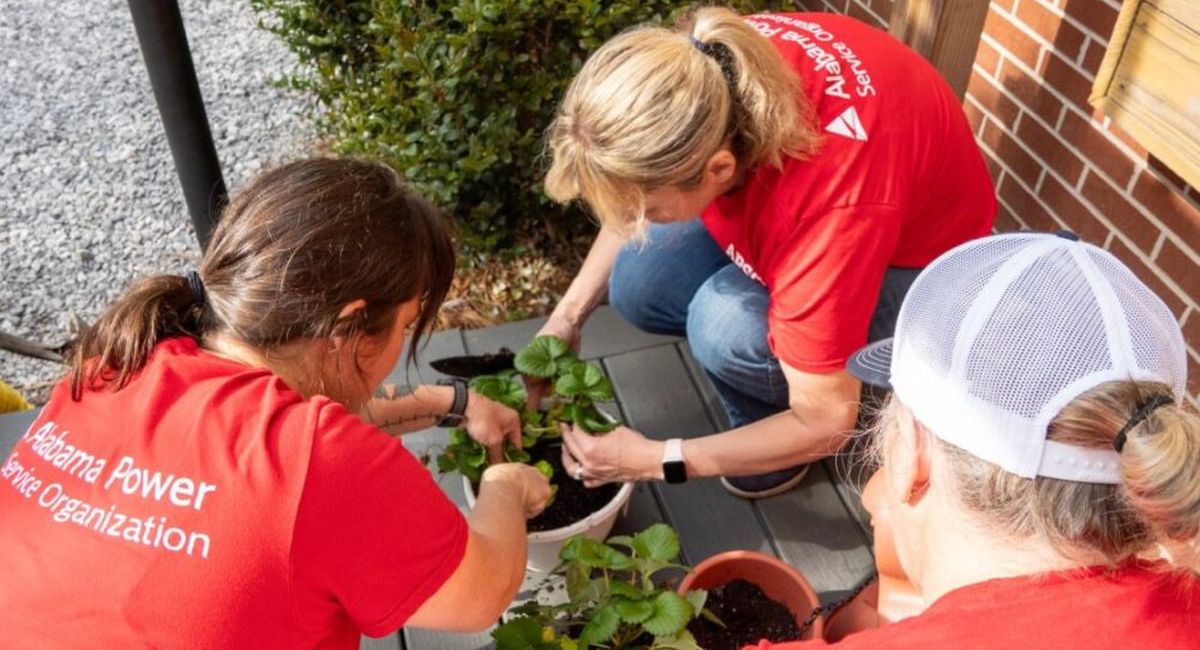100 Black Men of Greater Mobile empowering students at University of South Alabama

Underrepresented students are being uplifted with scholarships from the 100 Black Men of Greater Mobile. (Alabama Power Foundation)
Education equals empowerment – for individuals, for families and for entire communities. It’s a philosophy that Andre Green has seen play out and prove itself time and again in his position as associate vice president of academic affairs at the University of South Alabama (USA) in Mobile. “No matter where you come from, you can achieve success, and education is one sure way to get there,” he says. “Education is the great equalizer; with it, the sky is the limit.”
Another reality is also clear from his campus vantage point: “USA serves a lot of first-generation college students, and we know the need for help with college costs is there.”
Green’s position at USA is his day job. He’s also president of 100 Black Men of Greater Mobile, a chapter of the national civic and service organization based in Atlanta. In this role, too, he is keenly aware of education’s impact as well as its history of exclusion – as are all the members of the organization.
“As Black men, we know the importance of education; every member in the organization probably has a testimony about how education changed and enriched their lives,” he says. “We also know that there are doors that remain closed.” Both truths are why the group is heavily involved in enhancement programs at local schools, like mentoring students and offering essential skills training, and why the membership began searching for an effective way to ensure all students have the opportunity to experience the positive evolution education can foster.
100 Black Men of Greater Mobile: empowering students at the University of South Alabama from Alabama NewsCenter on Vimeo.
The university had a like-minded vision. While USA has a rich legacy of aiding its students with scholarships, it also understands that the costs can still be out of reach for some. These shared thoughts led the university to partner with 100 Black Men to create a new endowed scholarship. And the specifics of the fund were shaped by our country’s stream of recent racially motivated injustices.
“100 Black Men and the university wanted to do something that would recognize and remember people who had fallen to systems of oppression, people like Breonna Taylor, George Floyd and Ahmaud Arbery, and at the same time, be proactive in meeting the student needs we know exist,” Green says. “We wanted to break down any barriers that were keeping them from finishing college. That’s the ultimate goal – graduation.”
The result: the Leadership in Social Justice and Perseverance Scholarship, established in 2020 and initially endowed by 100 Black Men. Today, it supports USA seniors from groups currently underrepresented at the institution, including students of color, giving them the necessary tools to push past boundaries and rise to present and future challenges. This collaboration shows USA’s continued commitment to diversity on its campus and in its classrooms and to uplifting its community by making a degree more accessible and attainable.
Proven performance
Not just any senior is eligible for a Leadership in Social Justice and Perseverance Scholarship. First, financial hardship is considered. “We try to encourage kids who have the need to apply; that is who we are really trying to help,” Green says.
But that’s only one factor. The selection committee is looking for a track record of endurance, too. Students who are already running a strong race in the face of past barriers to access, and other struggles, have the best shot. “The funds are going to underrepresented students who have shown themselves to be leaders, to be passionate about human rights and social justice and have proven themselves academically. We want to help them cross the finish line to graduation,” Green says.

The Alabama Power Foundation is supporting scholarships at USA through 100 Black Men of Greater Mobile. (Alabama Power Foundation)
A minimum 3.0 GPA is a requirement, and though the scholarship is not limited to any one area of study, certain fields tend to stand out, according to Green. “One of the current recipients is going to be a teacher, and now, we are able to offset some of her costs,” he says. “And teachers, among others, are some of those who do so much good in our communities, who have that dedication this scholarship is focused on, and yet are often paid the least, so we consider that.”
Keeping students learning and increasing graduation rates is the mission, but Kennedy Reese, a senior from Madison, Alabama, and one of three in the first cohort of scholarship recipients, stresses that the scholarship’s benefits go beyond the dollars. “The money is a huge help and has allowed me to focus more on my studies, but it’s a real boost to have earned it,” she says. “It lets me know that I, and other students like me, are being recognized for our efforts, and it shines a light on what we are doing and what we are dealing with.”
Reese is studying secondary education with a concentration in social sciences. She plans, after attending graduate school, to become an education administrator. In this role, she believes she can broaden her ongoing social justice efforts that helped earn her the scholarship. “Here on campus, I’ve constantly been pushing for social justice in both small and large spaces, starting those hard conversations in the classroom and advocating for diverse populations in general but especially at USA,” she says. “At grad school, I’ll be diving deeper into diversity and inclusion, and once I am an administrator, I want to build on that. My main goal is to give students of all backgrounds a positive and safe place to grow and learn.”
Priscilla Agyemang echoed Reese. She is a senior from Pensacola, Florida, studying sociology and is also one of the first scholarship recipients. Medical school is her next step, with plans to go into pediatrics.
“I’m so grateful to everyone who made this scholarship possible,” she says. “It’s really helped me balance my finances with my academics and given me more freedom to focus on my classes, but it also solidifies my passion for social justice.” Agyemang says standing up for herself and others is “just how I was raised,” and she’s proud to lead the way for students coming behind her. “I’m always trying to advocate for others who need it, and this scholarship is doing that, too. It will be so great for other underrepresented students,” she says.
What’s next
To honor past social justice victims and aid future generations in creating a brighter tomorrow, the 100 Black Men didn’t just seek donations from others for the scholarship endowment. Members put their own money in, seeding the fund themselves. “We’ve supported this from our own pockets,” Green says. “Our members have put $35,000 into the fund because we all believe so strongly in what it can accomplish.”

In the time since, the fund has flourished, thanks to the generosity of multiple individuals, companies and organizations, including the Alabama Power Foundation. And every cent donated is matched through the university’s Mitchell-Moulton Scholarship Initiative.
Everyone in the first group of seniors to receive Social Justice and Perseverance Scholarships received $1,500, thanks to a gift from a USA trustee designed to jump-start the program and deliver funds to deserving students faster. This year, recipients will be awarded $22,000 each, which will come from the endowment.
The endowment is now closing in on its $500,000 goal, but according to Green, there’s no intention of stopping there. “I want to raise as much as we can. This money directly helps students, and the more money we raise, the more students we help,” he says. “They, in turn, will take the skills and mindfulness they’ve learned and improve their communities, and it just keeps going.”
This story is from the newly released Alabama Power Foundation 2021 Annual Report. To view the complete report and learn more about the foundation’s programs and initiatives, please visit powerofgood.com.





